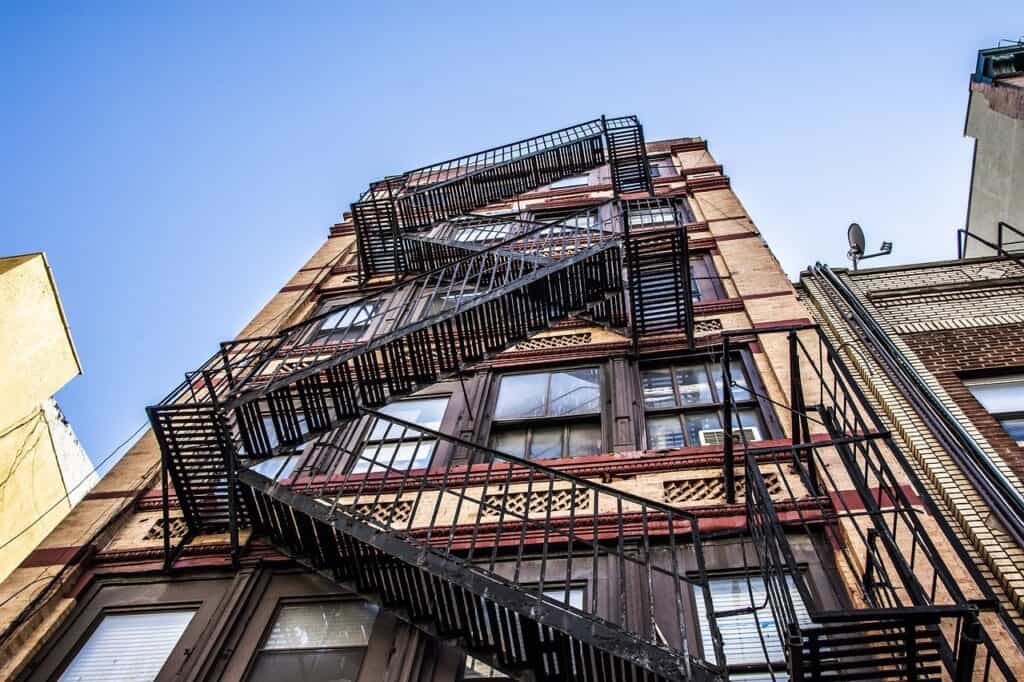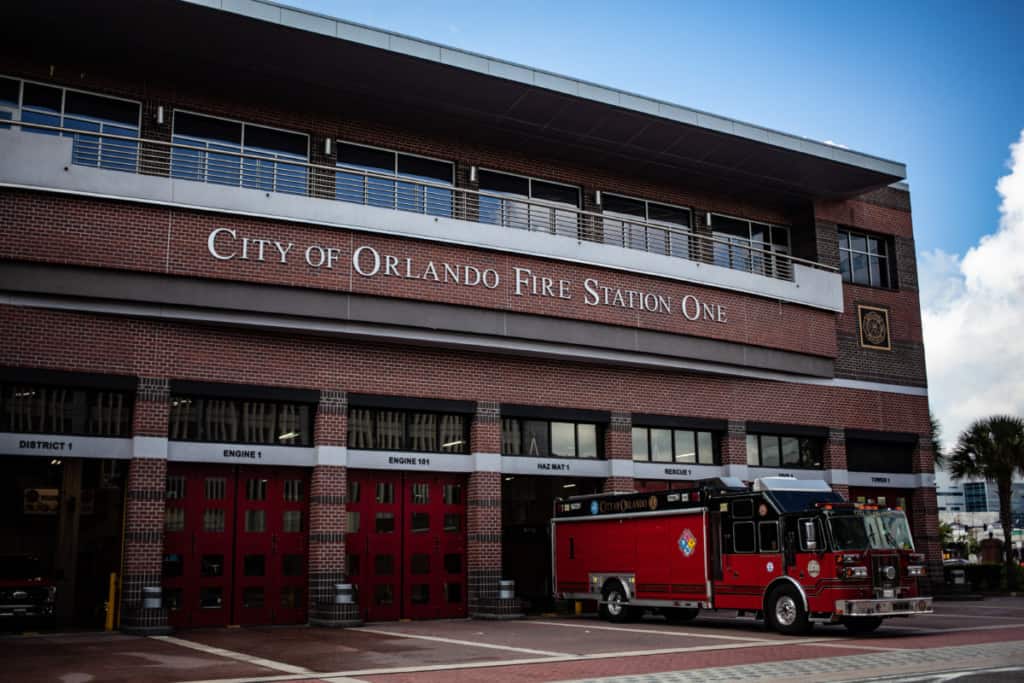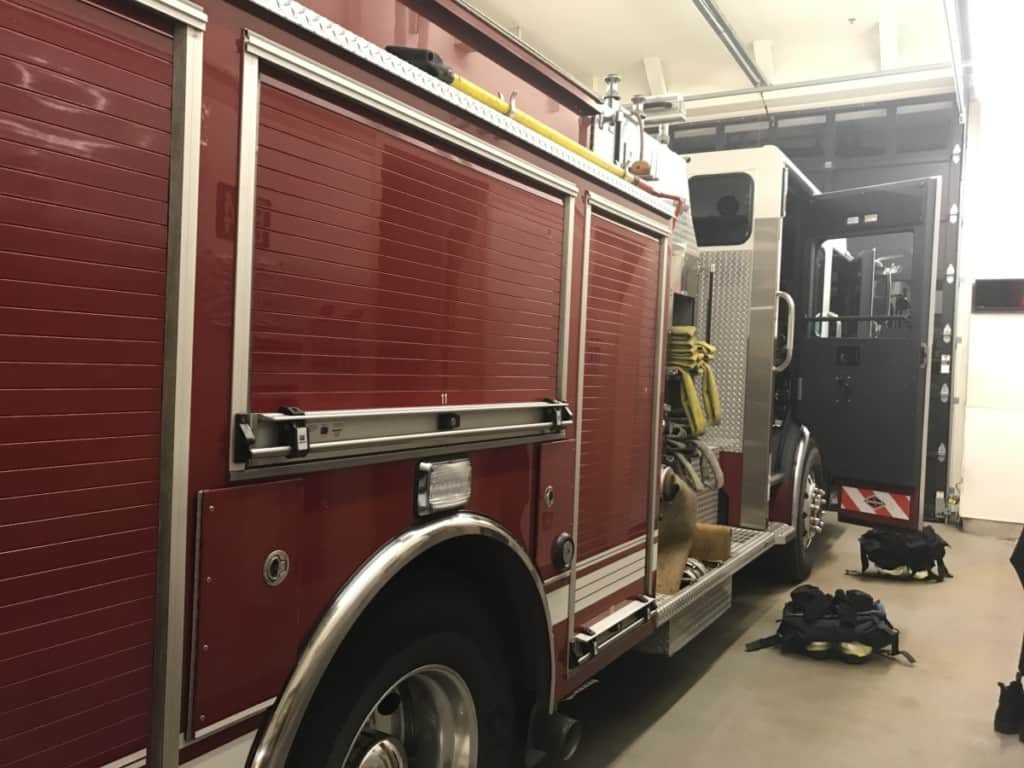A fire in your home is the stuff of nightmares, but it is better to be prepared for what to do in the event of a fire than to bury your head in the sand. If you live in an apartment complex, then there are a few things that everyone needs to be aware of to keep them safe and the good news is that they are very simple to remember.
If the fire alarm goes off in your apartment, treat it seriously. Evacuate the building. Do not use elevators to exit, always use the stairs. If the exit is blocked by flame or smoke, then you should return to your apartment and try to seal it against smoke. Call 911 for firefighters to respond.
Fire alarms are loud for a reason. They are designed to alert and awaken anyone who may be threatened in a fire, but they only work if they are treated as though it is an emergency. Here’s what you need to know about apartment fires.
Your # 1 priority is keeping your family safe. As a firefighter, I recommend everyone has updated smoke detectors that don’t require battery changes, like these ones from Kidde, a fire extinguisher, like this one from Amerex, and a fire escape ladder if you have bedrooms above the first floor, I recommend this one from Hausse.
Also read: Should You Open Windows During A Fire? Is It A Good Idea?
How Common Are Fires In Apartment Buildings?
Well according to the National Fire Protection Association (NFPA), in 2016, there were approximately 95,000 fires in apartment buildings, and this is out of an estimated 380,000 fires in residences throughout the United States.
That means 1 in 4 residential fires takes place in an apartment. The NFPA noted that more than 325 people died and more than 3,375 were injured in these fires too.
You don’t want to be inside your apartment when this happens:
It is fair to say that the number of fire incidents in the United States is on a gradual decline and has been for a long time. This reflects the increasing levels of construction standards and the materials used in construction with a focus on fire prevention.
However, there will never come a time when fires are completely eliminated and thus, fire will always be a risk in apartment buildings.
So, even if fires in apartment buildings aren’t that common, they aren’t rare either and you should be prepared.
What To Do When The Fire Alarm Goes Off

Firstly, a long time before you have to worry about this, you should have reviewed the apartment building’s fire safety plan – if there isn’t one, you should demand one. You should have been given a copy when you signed your lease and there should be copies in most common areas of the building.
This plan should help you understand the best route to take during an evacuation so that you can exit the building in the fastest safe manner.
It may also include notes on basic equipment that you might want to keep in the apartment in case a fire breaks out (a general-purpose, Classes A, B, C fire extinguisher).
However, when you hear the alarm, the reaction is simple. Take it seriously.
Make sure you are appropriately dressed. Exit the apartment (you may lock it up after you). Then walk (don’t run – accidents are caused by running in the event of a fire and may make things worse and not just for you, but for other residents of the building) to an exit.
If this involves going down floors to the ground, you must ensure that you use the stairs and not the elevator in the building. If an elevator gets trapped or the cable is severed as the result of the fire, being inside it can get you killed.
When you get outside of the building – you should assemble at the marked assembly point, so that you can be accounted for and there are no wasted efforts trying to find you within the building.
You should only return to the building when you have been informed by the fire service that it is safe to do so.
Local Smoke Alarms vs Fire Alarms
One thing that is important to do is to distinguish between local smoke alarms and fire alarms.
In most apartment buildings, if a fire alarm sounds, it will be transmitted to every single apartment and common area in the building to trigger an evacuation.
A local smoke alarm, on the other hand, may only trigger in the vicinity of the smoke itself.
Why? Well, smoke alarms can be pretty sensitive, and it’s entirely possible for burning food in a kitchen to trigger the smoke alarm. It would be pretty annoying if you had to evacuate the building every time that your neighbor burned their toast, wouldn’t it? (Though some apartment buildings are set up like this).
However, if you can hear a smoke alarm – you should investigate the sound and ensure that it is not an emergency. If you discover a fire, you should activate the alarm system and then, if you feel confident to do so and you have the correct equipment to hand, you can try to put out a small fire with a fire extinguisher.
If you don’t feel confident to tackle the blaze, you should evacuate the building and call the fire service (911) to ensure they are aware that the alarm has been going off (they should be, most fire alarms are connected to the local fire station now).
If your smoke alarm is going off and you cannot identify the source of the smoke within your apartment, you should check outside the front door – it is possible that there is a fire elsewhere in the building and smoke is creeping under your door.
What To Do If You Find Smoke Or Fire In A High-Rise Building?

OK, if you live in a multi-story building and you find fire and/or smoke in sufficient quantity to think that life and property might be in danger, what do you do?
The right thing to do is always to activate the alarm system before you do anything else.
This means that everyone else in the building has the best chance of evacuating if things get out of hand. Then, you should decide whether or not you can tackle the blaze with anything you have to hand – if not, then you should evacuate.
Again, head down the stairs but if you find that you are confronted with fire and/or smoke and can’t go any farther, what should you do?
It’s simple, you go back to your room. You then want to seal up the door – place a wet towel on the floor and use it to block the base. You can even use duct tape and put it all around the door frame and then call 911. Explain where you are that you are trapped in your apartment and cannot get out.
Why? Well, high-rise buildings are designed not to burn.
It takes 2 hours for a fire to spread from one floor to the next and it takes about an hour for the fire to burn through any dividing walls. In short, the building should protect you as long as you avoid breathing too much smoke while you wait for the fire department to rescue you.
Why Not Go For The Roof?
You don’t go for the roof for two reasons:
- Smoke and heat rise. Because they rise, fires tend to spread fastest upwards. This means that going up higher usually isn’t in your best interest.
- Where are you going to go afterward? This isn’t a Hollywood blockbuster, this is real life, the fire service won’t be airlifting you from the roof in helicopters, they don’t have the resources to do that.
Conclusion
What to do if the fire alarm goes off in the apartment? The most important thing to do is to take it seriously, if it turns out to be a drill or a false alarm, then you will have to put up with some minor inconveniences. If, on the other hand, it turns out to be real, the faster you act to get yourself to safety, the more likely it is that you will survive the incident.
Don’t forget to always take the stairs, elevators are a very dangerous space to be in during a fire, and only descend if it is practical and safe to do so. If not, return to your apartment. Apartment buildings are designed to burn very slowly, seal the door with wet towels to prevent smoke from entering, and wait for the firefighters to tackle the blaze.
Related Articles:
How Do Firefighters Receive 911 Calls?

